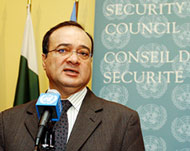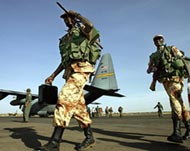Arabs offer Israelis olive branch
Arab leaders meeting in Sudan have promoted a land-for-peace offer to Israel, even as Israelis voted in polls that could give their next government a mandate to impose permanent borders with the Palestinians.

The annual Arab League summit demanded the opposite approach – a return to Middle East peace talks sponsored by international mediators – and leaders criticised threats to cut aid to the Palestinian Authority when Hamas takes office.
The leaders also reached a summit deal to provide funding for cash-strapped African Union troops in Sudan’s Darfur region amid international pressure to accept the dispatch of a UN force.
A draft final communique, which is not expected to undergo substantial changes, reaffirms an Arab initiative of 2002 which offers Israel peace in exchange for withdrawal from land occupied in the Middle East war of 1967. Israel rejects the offer.
The statement calls on donor countries to respect the electoral choice of the Palestinians, who gave Hamas a sweeping victory in January, and fulfil commitments to give them aid.
Quartet, peace plan
Foreign ministers meeting at the weekend recommended their governments maintain aid to the Palestinian Authority at $55 million a month and waive Iraqi debt worth billions of dollars.
 |
|
Al-Kidwa: Funding will continue |
Nasser al-Kidwa, the Palestinian foreign minister, said: “It is basically to continue with the funding as it has been.”
Al-Kidwa was referring to the agreement reached by heads of state on Tuesday.
The communique also calls on the Quartet – the United States, the European Union, Russia and the United Nations – to keep pushing the international peace plan known as the road map.
Hamas and many Israeli politicians consider the plan to be dead. Israel says it is unrealistic.
Poll campaign
Ehud Olmert, the interim prime minister, has campaigned for Tuesday’s poll on a plan to set Israel’s borders by 2010 by retaining big Jewish settlement blocs in the occupied West Bank and dismantling smaller ones.
Khalid Mishaal, the Hamas leader, not invited because Hamas is not yet in office, said in Damascus: “Our requests are clear; we expect the summit … to respect the will of the Palestinian people and support it financially, morally and politically.”
 |
|
Mishaal: We expect the summit’s |
The European Union, a major donor to the Palestinian Authority for years, said it would not abandon the Palestinians but could work only with “those who seek peace by peaceful means” – a clear threat not to finance a Hamas-led cabinet.
Benita Ferrero-Waldner, the EU external relations commissioner, said: “We have to look first at how a new (Hamas) government will react and according to that we will then take the decision … for the time being we are still listening.”
The Europeans, along with Israel and the US, demand that Hamas recognise an Israeli right to exist, renounce violence and accept past agreements with Israel.
Kofi Annan, the UN secretary-general, in a speech read for him, said the Islamist group should endorse the Arab peace initiative as a first step towards meeting Quartet demands.
Darfur troop funding
Arab leaders reached the deal on funding to the African Union (AU) troops after Sudan pressed fellow members of the Arab League to reject plans for the deployment of UN peacekeepers to Darfur, where war, disease and famine have cost up to 300,000 lives in three years.
Announcing a deal after a closed-door session at the summit, Ali Abdullah Saleh, the Yemeni president, said Arab leaders had also agreed to strengthen the AU force by providing troops from Arab states.
 |
|
Agreement has been reached to |
War broke out in Darfur in February 2003 when rebel groups revolted against what they say is the political and economic marginalisation of the region’s black African ethnic groups by the Arab-dominated government in Khartoum.
Al-Kidwa confirmed that an agreement had been reached to “finance the AU troops for a period of six months” or until the end of its current mission which was renewed in March.
He said Arab leaders had called on Arab African countries to send more troops to join the AU force.
Amr Mussa, head of the Arab League,confirmed an agreement on funding but declined to disclose the total that would be provided by Arab countries.
However, a diplomat said an aid package of $150 million was being discussed.
The move follows a vote in the UN Security Council on Friday to speed up plans to deploy peacekeepers to replace the AU mission.
Meanwhile, leaders are expected to endorse a draft resolution stressing the need for an Arab role in the future of Iraq and supporting efforts at reconciliation sponsored by the Arab League.